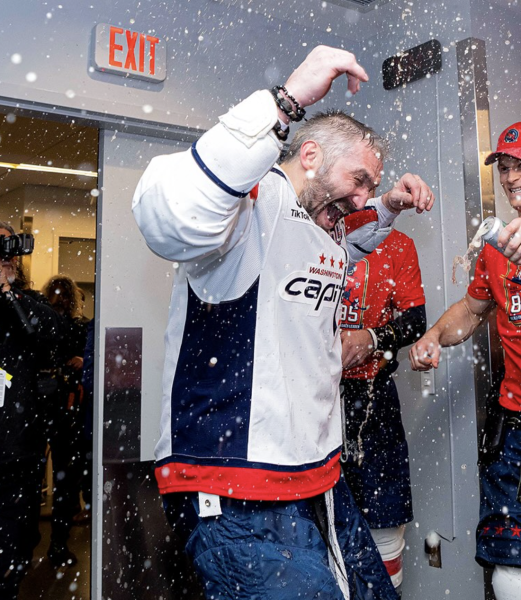On April 6th, Alex Ovechkin (Ovi) and the Washington Capitals traveled to New York looking for a win but more importantly, the all-time goal record. About 7 minutes into the 2nd period, Ovi scored a power play goal on Islanders goalie Sorokin. This goal, the 895th of his career, is one of the most historic National Hockey League (NHL) plays, as it propelled Ovechkin past the Great One, Wayne Gretzky, on the all time scoring list.
The road to goal number 895 did not happen overnight. Alex Ovechkin’s NHL career began in 2004, when he was drafted first overall to the Washington Capitals. But he did not make his debut until the 2005-06 season, where he scored two goals in his first appearance, setting a tone for his career of career-making achievements.
Ovi’s dominance as a rookie extended through the rest of the season, where he led rookies in nearly every offensive statistic and finished third in the league in both points and goals. He set a record for shots taken by a rookie, was named an all-star in his first season and took home the Calder Memorial Trophy, an award for the best rookie. His dominance also led to a video game cover for NHL 07, all following only one season of play.

After a few dominant seasons, Ovechkin had put the league on notice, and the Capitals wanted to keep him around as he averaged more than 50 goals per season in his first 3 years. The team signed him to a mega-deal: 13 years and $124 million. This became the largest contract in NHL history, a record still held today. The Capitals showed their faith in their rising star to become one of the greatest to ever put on skates, and he did not disappoint.
Shortly after signing his extension, Ovechkin broke the Capitals’ single-season goal record, won his first of three Hart Trophies — the NHL’s most valuable player award — and won three other major trophies that season, including the Rocket Richard Trophy, which goes to the top goal scorer each season. Ovechkin would go on to win the award a total of 9 times, 6 more than any other player. His early dominance set the tone for his legendary career to follow.
The next era of Ovechkin’s career began in 2010, when he became captain of the Washington Capitals, a title he still holds today. He continued his dominance for the next decade after becoming captain, with his leadership of the team culminating in 2018 when he led the Capitals to their only franchise Stanley Cup victory. That year, Ovechkin also took home the Conn Smythe Trophy, as the MVP of the Stanley Cup Playoffs.
At the time of winning the Cup, Ovechkin notched over 600 career goals and was within the top 20 scorers of all time. This is where his “Chasing Gretzky” era began. He continued to be a top goal scorer in the league even past his 15th season, and stayed motivated by passing all-time hockey greats with each goal closer to the record.
Entering the 2024-25 season, Ovechkin had 853 career goals, the second-most all time and well within reach of Gretzky. Ovechkin, obviously motivated by the record, is still averaging over a point per game in the 20th year of his career.
Going into the Capitals’ April 4 home game against the Chicago NHL team, Ovi was only two goals behind Gretzky. He scored his first of the game less than four minutes in, and was able to tie the record on a power play goal in the 3rd period.
The Capitals then traveled to New York to play the New York Islanders on April 6, with the goal of making Ovechkin the NHL’s all-time leading scorer top-of-mind. With The Great One in the stands, he scored his 895th goal and secured the long-desired record of NHL all-time leading goal scorer in the second period of the loss to the Islanders on a power play goal assisted by Tom Wilson and Dylan Strome.
With this legendary goal, Alex Ovechkin passes Wayne Gretzky as the all-time leading goal scorer and secures his place as the definitive greatest goal scorer of all time. Ovechkin’s legendary chase may have culminated on Sunday, but his 895 goals (and counting) have had a tremendous impact on the Capitals and, most importantly, on the sport of hockey overall.